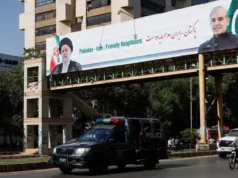US Under Biden Will Turn To India For A More Reliable Supply Chain
 Arun K. Singh, former Indian ambassador to the US
Arun K. Singh, former Indian ambassador to the US
”US policy on Pakistan has often oscillated between incentivizing and pressurizing. We will have to see what immediate strategy is selected given US dependence on Pakistan at this stage for the ongoing talks with the Taliban”
Joseph Biden, the new President designate, is all set to take office as the 46th President of the US in January. So what are the implications for India? According to Arun K Singh, former Indian ambassador to the US, the Biden campaign had released an Agenda for the Indian American community on 15 August, in which it had stated that “Biden will deliver on his long-standing belief that India and the US are natural partners, and a Biden Administration will place a high priority on continuing to strengthen the US-India relationship.” But India could face challenges in dealing with Biden on climate change, human rights and US policy on Pakistan. On China, the US under Biden will also look to India as it seeks to develop a more reliable and less China centric, supply chain.
The election scenario in the US, it was a rather unprecedented situation wasn’t it?
Indeed, it was. In the recent past, normally the losing candidate has conceded on election night itself, or at the very latest, the next day. One exception was in 2000, when incumbent Vice President Al Gore first conceded in an extremely close race, and then took back the concession when subsequent trends in the deciding vote count in Florida suggested that he could possibly win. Votes were contested, matter went to Courts, and it was eventually resolved 36 days after the elections when the US Supreme Court ordered a halt to further counting, with his Republican rival George W Bush in the lead. In this instance, the trend was clear, a President- elect has been declared by the media and others, as was done in past, although official certified results take somewhat longer. But incumbent President (Donald) Trump, given his personality, does not want to concede, and would prefer to be seen as forced out “unfairly” by “voting fraud” or “biased court decisions”. This would polarize US society further, and dent US soft power internationally as a vibrant and disciplined democracy. This could also make for a complicated transition process in the days ahead
Should there be a challenge to the electoral verdict by Donald Trump, what will be the impact on the day to day running of the US government?
There would be no impact on the immediate day to day running of US government. The new President will be inaugurated only in the third week of 2021. In the interim, there is a process of different State legislatures receiving certified vote counts for their respective States, choosing electors in numbers ascribed to them for the electoral college, and the results from different States being received by US House of Representatives in early January for final authentication of the results. In the interim, the President elect chooses a Transition Team that is briefed by officials in different agencies and departments, so as to be fully ready to take over on due date. Trump could thwart or delay this, leading to less preparation for the change- over in 2021. Further, if there is uncertainty during this interim phase, US capacity to respond to any crisis could be weakened.
Would a Joe Biden administration be more inward looking, not pro-globalisation, more focused on domestic issues? There are commentaries that say that whoever comes to power in the US, given the narrow margin of victory that could get contentious if it goes to court, will be heading a weakened administration.
The era of post 1990 globalization effectively ended with Trump’s election in 2016. His victory symbolized the blowback from a significant 35- 40 % of US population that felt that it had lost out in the process, with stagnation in wages, decline in longevity, increase in death rates and drug addiction in their midst. This prompted the Trump rallying cry of onshoring and bringing jobs back to America, tightening on immigration and H1B visas. Joe Biden has also said that “economic security is national security”, and that he would not enter into any new trade agreements until “we have invested in Americans and equipped them to succeed in the global economy.”
Once the new President is inaugurated, he will have the necessary powers to govern, subject to cooperation from US Congress which, in terms of US Constitution, sees itself as a co- equal branch of government. Joe Biden would have to factor in that the Senate may remain with a Republican majority, and the House, contrary to poll projections, saw a reduced Democratic majority. This would prompt calls to govern with accommodation and with more centrist policies. In his “victory speech” on November 8 (IST), Biden spoke of accommodation and cooperation with political opponents.
What are the consequences for the world and more specifically for India of this – i.e. of a Washington that is distracted by domestic issues?
Domestic issues will, no doubt, remain a priority. Biden has repeatedly listed response to covid-19, economy, race and climate change as requiring immediate post- inauguration attention. For many of them, however, international cooperation will be required. Covid1-19 is a global pandemic, requiring cooperation for vaccines and protocols for response. US economy cannot revitalize without also addressing predatory Chinese trade practices, and thefts of data, technology and intellectual property. He has said that he will re-join the 2015 Paris accord on climate change, and seek enhanced international commitments on emissions. The Biden campaign had released An Agenda For The Indian American Community on August 15 this year, where it had stated that “Biden will deliver on his long-standing belief that India and the United States are natural partners, and a Biden Administration will place a high priority on continuing to strengthen the U.S.-India relationship. No common global challenge can be solved without India and the United States working as responsible partners. Together, we will continue strengthening India’s defence and capabilities as a counter-terrorism partner, improving health systems and pandemic response, and deepening cooperation in areas such as higher education, space exploration, and humanitarian relief. “
After the 2+2 talks, Secy of State Mike Pompeo had said that the US stands with India on the question of its sovereignty and territorial integrity. Is this an assurance New Delhi can rely on now that a Biden administration will be in office?
In the same Agenda, it was also stated that “Biden believes there can be no tolerance for terrorism in South Asia – cross-border or otherwise. A Biden Administration will also work with India to support a rules-based and stable Indo-Pacific region in which no country, including China, is able to threaten its neighbours with impunity.” Biden has been supportive of India over the years: in 2001, as Chair of Senate Foreign Relations Committee, he had written to President George W Bush, calling for removal of sanctions against India; in 2008, as Ranking Member of same committee, he had helped pilot US- India civil nuclear cooperation agreement through the Senate; as Vice President, he was part of the Administration that declared India a Major Defence Partner, and expressed support for India’s permanent membership of UN Security Council.
What are the challenges and areas of convergence for India in a Biden administration?
In response also to sentiments of the progressive wing of the Democratic party, Biden would want to be pro- active on climate change issues. India will need to protect its interests if there are expectations beyond what we consider justified. Similarly, there could be difference of perceptions on some human rights issues, though US has its own challenges related to race and voter suppression. US policy on Pakistan has often oscillated between incentivizing and pressurizing. We will have to see what immediate strategy is selected given US dependence on Pakistan at this stage for the ongoing talks with the Taliban. The economic, technological and military challenge from China, and its effort to reshape the international order and norms will provide an important convergence. US will also look to India as it seeks to develop a more reliable, and less China centric, supply chain. The August 15 Agenda also asserted that “as the world’s oldest and largest democracies, the United States and India are bound together by our shared democratic values: fair and free elections, equality under the law, and the freedom of expression and religion. These core principles have endured throughout each of our nations’ histories and will continue to be the source of our strength in the future.”
Do you see a Biden administration nuancing/tinkering/changing current policies towards Russia, Pakistan, China, Afghanistan and the Indo-Pacific? And by how much?
The Trump Administration started with pressure on Pakistan, cutting off assistance, but has now relied on it for the Taliban talks. Biden’s response would depend on extent of Pakistan’s cooperation, and assessment of actions against terrorist groups, particularly those that target the West and US. As Vice President, Biden had argued for US withdrawal from Afghanistan, seeing the negative impact on US society, and assessing an eventual need for internal Afghan political reconciliation. He would likely seek to sustain the present effort if it moves in a positive direction. There is now a broad consensus in the wider US establishment that the earlier policy of engagement with China, in the expectation of political and economic liberalization, has failed, particularly under President Xi. China will be approached as a rival, but US will seek to coordinate more with its allies in Europe in fashioning an overall response, and some of the sharpness in the Trump Administration characterization of China could go away.
Post 2016, Democrats have been particularly antagonistic towards Russia, based on their perception of Russian interference through social media to help Trump’s election against Hillary Clinton. Biden would be expected to be guided by this, and also opposition to Russia’s take- over of Crimea and involvement in Eastern Ukraine. However, he will be less constrained than Trump should he wish to move positively, especially on arms control issues. US leaders understand that India has its own national security interests in the Russia relationship.
India is looking at a collaboration with the US on innovation to help it leapfrog into the next phase of economic growth. Will this expectation be met by the incoming US administration? What about the future of defence collaboration? The DTTI (Defence Technology and Trade Initiative) for instance?
US will need partners as it seeks to develop an alternative, and a more reliable and secure supply chain. US global competitiveness in many areas, particularly in digital technologies, will be enhanced through a partnership with India. Indian PM has also spoken of India becoming a trusted partner in supply chains, while also building its self- reliant capabilities. I believe US and India will both benefit by focusing on exploring cooperation in emerging technology areas such as artificial intelligence, cyber, data, digital, quantum computing. Governments as well as business on both sides should be involved early in a deep dive dialogue on possibilities based on synergies and complementarities. This would also provide a stronger geo-economic basis to the growing geostrategic convergence.
During the recent 2+2 meeting, on October 27, Indian Defence Minister Rajnath Singh had, in his media comments, emphasized defence innovation and industrial cooperation partnership, and called on US defence industry to set up MROs (maintenance, repair and operations) in India for US origin equipment globally. The DTTI had been initiated by the Obama- Biden Administration, so it can be expected to be continued, but clearly needs more work and projects.



